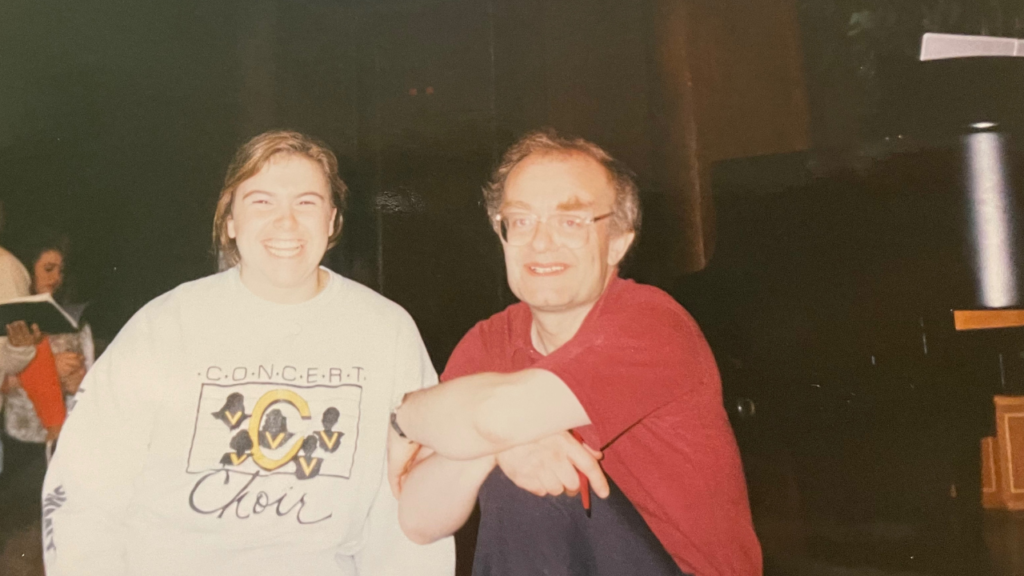Tightly gripping the black concert folder, I see a sea of nearly 3000 faces surrounded by red velvet and cream plaster. My breath catches: I’m about to sing on the stage of Carnegie Hall.
Five different levels of balconies and boxes held an audience eager for a moving performance.
A hundred vocalists on the risers and a hundred more musicians in their chairs…we were not free of fear. Blinking eyes, sweaty knees, and fidgety fingers revealed the undercurrent of nerves and excitement. What if this goes badly? What if I do it wrong? What if the audience hates it?
Do you ever feel that way about communication? What if this goes badly? What if I say it wrong? What if the other person hates me?

I’m imagining you want the same thing from your conversations we wanted on that stage: to connect in a moment, create an experience that brings change, and communicate a message.
In getting ready for a performance or a conversation, it’s easy to avoid preparation. I’ll just wing it! That’s the most authentic! And when you arrive at the conversation, it goes awry.
And it’s just as easy to assume it’s all your responsibility, and you become so rigid in your words that connection is lost and more problems created.
Both of these mistakes leave you ineffective and frustrated.
How do you get better at communication? Same answer: Practice, practice, practice.
Outside Carnegie Hall, NYC street vendors hawked t-shirts, magnets, and mugs with the famous phrase: “How do you get to Carnegie Hall? Practice, practice, practice.”
How do you get better at communication? Same answer: Practice, practice, practice.
But not just any kind of practice will do. You need productive practice.
Three productive practice steps to better communication:
- Know what you want in the end.
Where do you want this conversation to go? Hold expectations loosely, but have a direction. You may already know my three favorite preparation questions. These three questions give you a holistic view of the situation and prepare you for a productive experience: How do I feel? What are the reasons I think this? What do I want to do? - Write it down.
Preparation is not restrictive. It’s kind and efficient. Writing it down clarifies your ideas (on actual paper is the best. You know I love my post-its!). It also creates memory pathways in your brain so you can recall your ideas more easily in the actual conversation. Writing it down gives you some comfort that you have a loose script to rely on. You don’t have to hold it all in your mind. - Say it out loud.
You will have more confidence in a live conversation when you say it out loud before. (If this is written communication —an email, Slack, text — read it aloud before you send it.) When you practice saying it with your out loud words, you have physically formed the words before. You build self-trust because you’ve heard it and felt it before.
The first time “Magnificat, Magnificat” came singing from my mouth wasn’t on the stage before 3000 people. It was a rehearsal, sight reading the piece. And then countless times after that before taking the stage for the performance.
You don’t have to practice that much for a conversation, but say your words out loud as practice. It can be in front of a mirror, in the car, or walking your neighborhood (put your headphones in. They’ll just think you’re on the phone). If you want to build even more confidence, ask a friend or coach to role play with you.
Fear doesn’t disappear with practice, but confidence becomes the louder voice in your mind.
Imagine what it could be like, walking into a conversation not so wrapped up in what you are going to say and how you are going to say it. How would that feel to have space in your mind? To have room to be curious about the other person’s responses and ideas?
Fear doesn’t disappear with practice, but confidence becomes the louder voice in your mind.
Practice builds confidence and leaves room for curiosity in the moment, creating clearer communication, deeper trust, and better solutions.
As you’ve been reading, what conversation has popped into your mind? Maybe it’s a meeting you have next week. Or thinking about asking for a raise? Setting some boundaries? Pitching a new idea?
Here’s what I want you to do: try these three practice steps before the conversation. Take 3-5 minutes (or longer if you want) and practice. Bonus: tell me what the conversation is. I’ll check in with you and see how it went.

I didn’t stand on the white oak stage of Carnegie Hall alone. John Rutter was conducting. The composer was our guide through it all. And I’d love to help you as a guide. Because practice with a guide…that’s the magic of high performance.

COMMENTs:
0